In this interview, we speak to Stephen Glynn about his book, The British Football Film, ‘a genre study optimistically undertaken by a Janus-faced creature, a film historian and a fan of football’ (15). Glynn discusses the history and conventions of the British football film, touches on its representations of class, gender, race and sexuality and reflects on its possible future in an increasingly digital world.
Author Interview: Q&A with Stephen Glynn on new book, The British Football Film
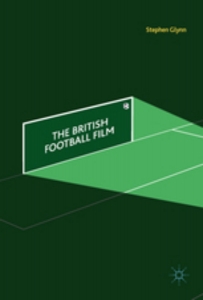 Find this book (affiliate link):
Find this book (affiliate link): ![]()
Q: Your book offers an in-depth history and analysis of the British football film – could you discuss some examples that give particular insight into its development and conventions?
I reckon there are 90-plus feature films on the 90-plus-minute game. Many are strictly ‘non-league’ in budget and artistry, but all try to entertain and are worthy of attendance. The first surviving full-length feature is The Great Game, directed by Jack Raymond in 1930 (and free to watch on the BFI Player here). An unconvincing romantic subplot lets it down a bit, but from a purely film history viewpoint, it is an interesting example of a film made during the transition from silent to sound cinema, finding its way with sound levels and dialogue and still using lengthy silent passages. But what it shows – and for the first time discusses – seems to me a footballing tension still bang up-to-date, with the team’s manager taking the long view and looking to blood young talent like the film’s hero Dicky Brown, but opposed by the club chairman who wants a quick fix by buying in established stars such as the costly (£5000!) striker Jim Blake. Blake was played by John Cock, an ex-Chelsea and England centre-forward now combining his playing with a music-hall singing career – he thus combines both the sound and football elements of the film quite successfully.
Almost the same discussions between manager and chairman occur in The Damned United, directed by Tom Hooper in 2009, and a rare football film in having a ‘high’ literary source, here adapted from the controversial, largely stream-of-consciousness novel by David Peace. This centres on the short-lived managerial career at Leeds United of brash ‘old big ‘ead’ Brian Clough, excellently played by Michael Sheen, again well-cast as he is not just a skilled impersonator but a talented footballer, as shown in a convincing training ground scene. British sports films have been accused of lacking the ‘elemental’ struggle and confrontation of US films like Raging Bull – well, watch some of the football scenes in The Damned United, recreated on a midweek mudbath of a pitch as ‘dirty Leeds’ do a job on Clough’s then-lowly Derby County, scenes which mirror the more insidious fighting for dominance in the changing room and boardroom. It’s also a film alert to the game’s mediatisation. Television’s interest in football was growing in the 1970s (until knocked back by the hooligan-riven 1980s): Clough, very aware of this, transcended his manager’s role to become one of British television’s first ‘expert commentators’, and the film successfully plays at times with screens within screens.
And, of course, you have to watch Escape to Victory, entrusted to John Huston in 1981, which possesses none of the qualities discussed above, but stands over the whole genre like a leadenly acted, joyously implausible colossus. I write at length on this film, but a couple of points here. Like all cinema, it tells you most about the prevailing values when the film was made, notably here the insistence on class mobility passionately advocated by Michael Caine as PoW team captain John Colby – it’s very Thatcherite (or should that be Caine-sian?). But football has enduring qualities and so the film still resonates today: I was reminded of Pelé’s imperious overhead kick (reputedly completed in one take) when I saw Cristiano Ronaldo’s recent strike for Real Madrid against Juventus in the Champions League – both cases bringing opposition supporters to their feet in applause. Life imitating ‘art’, so to speak.
Image Credit: ‘goal’ by Martin Abegglen licensed under CC BY SA 2.0
Q: Your book discusses the ‘British football film’ – but many living in the nations of the UK would baulk at this description. How do you attend to the distinctiveness of the different national teams within the UK?
It is true that the majority of football films deal with English teams and/or their supporters. But a number cast the net wider and, through football, challenge the whole notion of Britishness. Home Nations tensions briefly surface in Steve Barron’s Mike Bassett: England Manager (2001) when the England squad encounters players from Scotland and Northern Ireland at an airport terminal, and friendly banter quickly degenerates into full-on tribal fighting. The voiceover at the start of 2001’s A Shot at Glory, where Robert Duvall no less plays a low-league Highlands manager, asserts the importance of football in Scottish identity formation, representation and resistance, and Danny Boyle’s Trainspotting (1996) balances its depiction of shifting trends in dance music, dress and drug-taking with a backdrop showing Scotland’s constant obsession with football. In 2015’s Shooting for Socrates, we see how Northern Ireland’s team of hard-drinking misfits and tenuously-qualified ‘ringers’ reached the 1986 World Cup and, if only briefly, unified a sectarian-riven country. Wales, I’m afraid, still awaits its moment of football film glory – The Gareth Bale Story, perhaps?
Q: You observe that ‘football is portrayed ambivalently as a valuable release from social difficulties, but also as a social infantilisation, an ‘‘opiate’’ diverting the discontent and disenfranchised from more purposeful political action’. Are any of these films overtly political interventions in their representation of ‘the beautiful game’?
The director who most regularly makes reference to football in his films, the genre’s ‘auteur’ if you like, is the ever-political Ken Loach. The celebrated central scene in his 1969 film Kes is a school football game, led by Brian Glover’s PE teacher. It’s gloriously funny, but also heartrending, and politically coruscating. There are no childhood sporting dreams here, just an extension of the education system’s contempt for ‘factory fodder’ working-class youth. School games here are not ‘character building’; instead they demonstrate how Billy Casper and his class (in all senses) are impotent victims of their teachers’ eccentricities and cruelty. Football is also present, and used with a political inflection, in Loach’s My Name Is Joe (1998), in Ae Fond Kiss (2004), in Tickets (2005) and most fully in 2009’s Looking for Eric, where the postman’s help from his workmates, and Eric Cantona’s avowal that his best moment in football was not a goal but a pass, possibly give Loach’s most forceful illustration of the political importance of collective action.
Q: Football has at times been denigrated as a working-class pastime, and your book draws attention to the complicated relationship between class and football. Do British football films help give particular insight into the complexity of class in Britain across the century?
Class is key to all representations in British cinema, down to the level of what is allowed to be seen, even what gets commissioned. It certainly explains why, until recently, football films were actually rather thin on the ground. Studios, happy to churn out films on horseracing, had little interest in proletarian fare like football: early silents such as 1920’s (sadly lost) The Winning Goal have a better class of star player – here one who reads Ruskin. Even the magnificent Arsenal Stadium Mystery from 1940, a film vaunted by the likes of Martin Scorsese, has the Arsenal team set against – and significantly struggling to beat – a team of Corinthian-style well-educated amateurs: professional football was evidently still not seen by studio executives as appropriate for a cultural product designed for a cross-class audience. Post-war football comedies remained largely northern and working-class until wider attention came in the 1960s with ‘pop star’ footballers such as George Best. But it is in the last 25 years or so, since the ‘soccerati’ (like Nick Hornby) kick-started a middle-class interest in football, that film treatments have exploded in number and diversity. Think of Hornby’s own adaptation of his novel Fever Pitch (1997), centred on Colin Firth’s university-educated schoolteacher. Coming at the issue from a different angle, some of the less generic formulations of the hooligan film with their evidently middle-class protagonists problematise early theories that terrace violence was an alienated class-conscious resistance to the ‘embourgeoification’ of football and its commodity culture.
Image Credit: ‘alloa v stirling IX_MMVI’ by D. Sinclair Terrasidius licensed under CC BY 2.0
Q: Concerning the commercialisation of the game, it doesn’t seem that many films directly explore the institutions governing football – are there films out there covering this topic, particularly in light of recent corruption scandals?
The ‘power games in the boardroom’? Not directly. The genre offers a more ‘bottom up’ viewpoint of the game’s socio-economic history. Mark Herman’s 2000 film Purely Belter, where two teenagers try desperately to raise the funds to buy a Newcastle season ticket, demonstrates quite clearly the alienation wrought on financially-stricken homegrown supporters by the processes of privatisation and neoliberal globalisation. It exposes how the Premiership no longer remotely represents ‘the people’s game’. (There’s also a short scene in David Cronenberg’s Eastern Promises (2007) showing the murder of a criminal rival by Russian mafia members outside the stadium after a Chelsea-Arsenal derby, which has been interpreted as implicitly linking the capital’s foreign gangs and oligarch club owners.)
Q: Your book also explores more recent films that address the sexism and homophobia that shroud the game, including Bend it Like Beckham (2002) and The Pass (2016). Can these play an active part in challenging these problems? It seems racism figures less as an overt topic in the British football film – is this the case?
British football remains, arguably, the sole bastion for homophobia, and The Pass, adapted from John Donnelly’s Royal Court play with Russell Tovey reprising his stage role, is a film well worth seeing, about a Premiership star struggling to ‘pass’ as heterosexual. It challenges, yes, but the problem for the film, as I recall a review pointing out, was finding an audience: would conventional soccer fans want to see a film about a gay player wrestling with his sexual identity, and would a modern LGBT crowd be sympathetic to the player’s at times self-loathing decisions?
Racism has received minimal treatment: a film like Bend It Like Beckham (correctly) shows different ethnicities playing together as a given, while several hooligan films emphasise – too much? – that football gangs or ‘firms’ have always welcomed black members and that their tribal battles were not racially motivated. That said, two films topping and tailing the genre’s hooligan treatments, Phil Davis’s I.D. from 1995 and the recent ID2 (2016) from Joel Novoa, explore more fully the parallels between football allegiances and wider issues of nationalism – and the whole fraught terrain of British racial politics.
Image Three Credit: ‘Bend in Like Beckham’ by Kandukuru Nagarjun licensed under CC BY 2.0
Q: Although the book acknowledges several blockbuster British football films – such as Bend It Like Beckham – you concede that ‘the football film remains, for all its positives, a financially fraught undertaking’. Why do you think such films have had mixed commercial success compared with the popularity of football itself?
Sport and film have been deemed a contradiction in terms. Football is an unscripted contest with its plot development and resolution unknown (unless your team is as poor as mine was last year); the football film tends to follow a set/predictable narrative pattern, with unsung or wasted individual talent coming good with a spectacular last-minute goal. And then there is the credibility of the action sequences – do you choose actors who cannot play or look like players, or good footballers who cannot act? Though CGI is helping to smooth over the latter issue (as in Goal! (2005)), the best football films side-step these drawbacks by minimising the action and offering a more analytical perspective on the game and its social context.
Q: You make it clear that representations of football have been shaped through a number of different screens – from cinema to television to digital. Does the latter (including computer games) pose a particular challenge to the future of the football film?
I’ve mentioned how, if given a sufficient budget, CGI can smooth over the generic fault lines in matchplay recreations. In the future? Sky Sports television recently featured coverage of the FIFA Interactive World Cup. I conclude my book with speculation on how gaming will influence the future not just of the football film, but the game itself: the Premiership has certainly lost a whole generation of paying fans (the average attendance is now aged 40+), and clubs, mindful of future fan creation, are currently signing up ‘e-players’ so they can reach out and ‘sell their brand’ to teenagers. The new Tottenham stadium also includes plans to host major e-sports events. A feature film featuring a football video games player would be a shrewd next move.
Q: Finally, any predictions for the World Cup 2018?
If the British football film teaches us anything, it is that a cup final will always be reached and probably won by the plucky underdogs overcoming adversity and all the obstacles put in their way with a precision last-minute free-kick or penalty. Iran, perhaps? No. Given their impressive performance at Euro 2016 in a kit reputedly modelled on that worn by the Allied prisoner-of-war team in Escape to Victory, then this surely has to be the tournament for Iceland.
This interview was conducted by Dr Rosemary Deller, Managing Editor of the LSE Review of Books blog. Note: This interview gives the views of the author, and not the position of the LSE Review of Books blog, or of the London School of Economics and Political Science. The LSE RB blog may receive a small commission if you choose to make a purchase through the above Amazon affiliate link. This is entirely independent of the coverage of the book on LSE Review of Books.



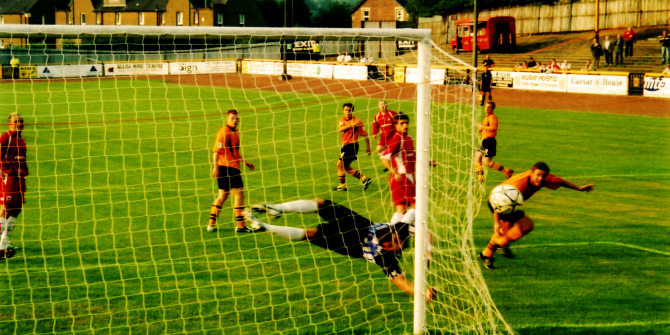
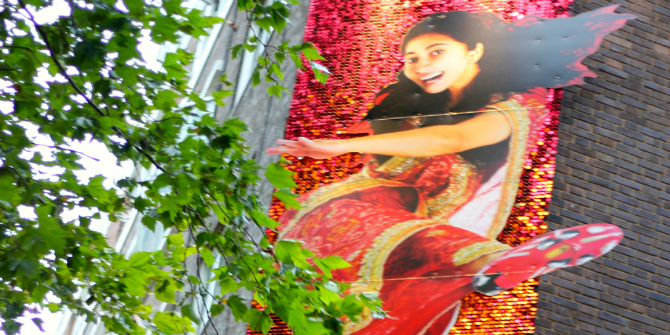

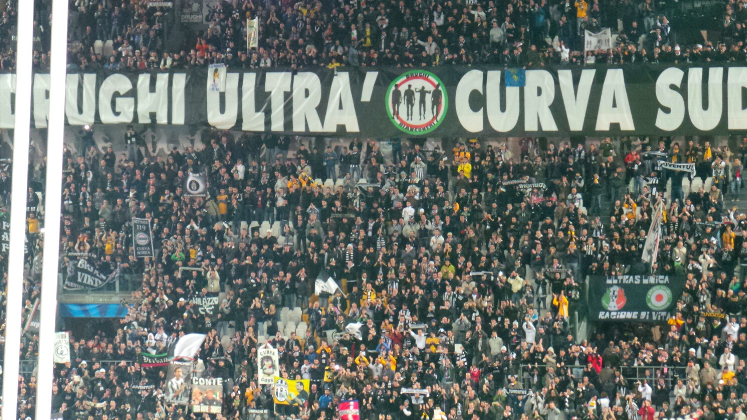

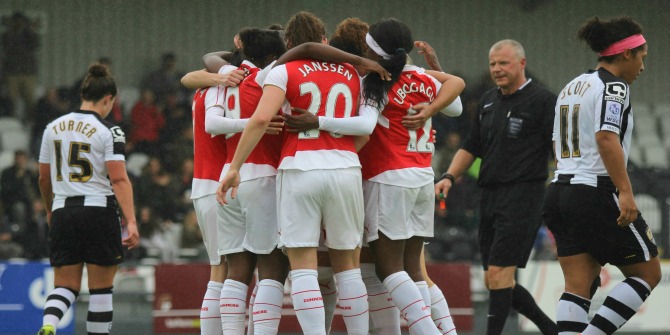


Very enjoyable interview. That Archie Gemmill goal was a great moment from my childhood and is now conflated with the sordid activities of Edinburgh drug-takers! Such is the power of film.
In the Mike Leigh film Life is Sweet there is a marvellous drunken conversation about the great Spurs double-winning team of the early 1960s, with Blanchflower as the cliché goes being “the architect of the modern game”. Conversely, Arsenal’s league title of 1970/71 is described as a defeat for football – the work of journeyman not artists. Something to set off against Nick Hornby for sure …